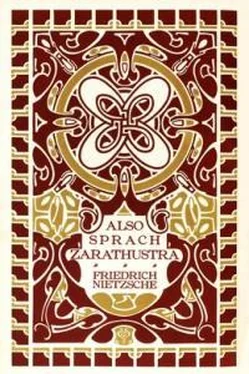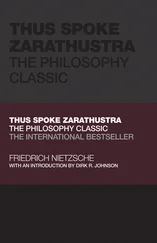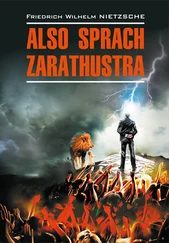Zarathustra, however, remained standing, and just beside him fell the body, badly injured and disfigured, but not yet dead. After a while consciousness returned to the shattered man, and he saw Zarathustra kneeling beside him. "What art thou doing there?" said he at last, "I knew long ago that the devil would trip me up. Now he draggeth me to hell: wilt thou prevent him?"
"On mine honour, my friend," answered Zarathustra, "there is nothing of all that whereof thou speakest: there is no devil and no hell. Thy soul will be dead even sooner than thy body: fear, therefore, nothing any more!"
The man looked up distrustfully. "If thou speakest the truth," said he, "I lose nothing when I lose my life. I am not much more than an animal which hath been taught to dance by blows and scanty fare."
"Not at all," said Zarathustra, "thou hast made danger thy calling; therein there is nothing contemptible. Now thou perishest by thy calling: therefore will I bury thee with mine own hands."
When Zarathustra had said this the dying one did not reply further; but he moved his hand as if he sought the hand of Zarathustra in gratitude.
7.
Meanwhile the evening came on, and the market–place veiled itself in gloom. Then the people dispersed, for even curiosity and terror become fatigued. Zarathustra, however, still sat beside the dead man on the ground, absorbed in thought: so he forgot the time. But at last it became night, and a cold wind blew upon the lonely one. Then arose Zarathustra and said to his heart:
Verily, a fine catch of fish hath Zarathustra made to–day! It is not a man he hath caught, but a corpse.
Sombre is human life, and as yet without meaning: a buffoon may be fateful to it.
I want to teach men the sense of their existence, which is the Superman, the lightning out of the dark cloud—man.
But still am I far from them, and my sense speaketh not unto their sense. To men I am still something between a fool and a corpse.
Gloomy is the night, gloomy are the ways of Zarathustra. Come, thou cold and stiff companion! I carry thee to the place where I shall bury thee with mine own hands.
8.
When Zarathustra had said this to his heart, he put the corpse upon his shoulders and set out on his way. Yet had he not gone a hundred steps, when there stole a man up to him and whispered in his ear—and lo! he that spake was the buffoon from the tower. "Leave this town, O Zarathustra," said he, "there are too many here who hate thee. The good and just hate thee, and call thee their enemy and despiser; the believers in the orthodox belief hate thee, and call thee a danger to the multitude. It was thy good fortune to be laughed at: and verily thou spakest like a buffoon. It was thy good fortune to associate with the dead dog; by so humiliating thyself thou hast saved thy life to–day. Depart, however, from this town,—or tomorrow I shall jump over thee, a living man over a dead one." And when he had said this, the buffoon vanished; Zarathustra, however, went on through the dark streets.
At the gate of the town the grave–diggers met him: they shone their torch on his face, and, recognising Zarathustra, they sorely derided him. "Zarathustra is carrying away the dead dog: a fine thing that Zarathustra hath turned a grave–digger! For our hands are too cleanly for that roast. Will Zarathustra steal the bite from the devil? Well then, good luck to the repast! If only the devil is not a better thief than Zarathustra!—he will steal them both, he will eat them both!" And they laughed among themselves, and put their heads together.
Zarathustra made no answer thereto, but went on his way. When he had gone on for two hours, past forests and swamps, he had heard too much of the hungry howling of the wolves, and he himself became a–hungry. So he halted at a lonely house in which a light was burning.
"Hunger attacketh me," said Zarathustra, "like a robber. Among forests and swamps my hunger attacketh me, and late in the night.
"Strange humours hath my hunger. Often it cometh to me only after a repast, and all day it hath failed to come: where hath it been?"
And thereupon Zarathustra knocked at the door of the house. An old man appeared, who carried a light, and asked: "Who cometh unto me and my bad sleep?"
"A living man and a dead one," said Zarathustra. "Give me something to eat and drink, I forgot it during the day. He that feedeth the hungry refresheth his own soul, saith wisdom."
The old man withdrew, but came back immediately and offered Zarathustra bread and wine. "A bad country for the hungry," said he; "that is why I live here. Animal and man come unto me, the anchorite. But bid thy companion eat and drink also, he is wearier than thou." Zarathustra answered: "My companion is dead; I shall hardly be able to persuade him to eat." "That doth not concern me," said the old man sullenly; "he that knocketh at my door must take what I offer him. Eat, and fare ye well!"—
Thereafter Zarathustra again went on for two hours, trusting to the path and the light of the stars: for he was an experienced night–walker, and liked to look into the face of all that slept. When the morning dawned, however, Zarathustra found himself in a thick forest, and no path was any longer visible. He then put the dead man in a hollow tree at his head—for he wanted to protect him from the wolves—and laid himself down on the ground and moss. And immediately he fell asleep, tired in body, but with a tranquil soul.
9.
Long slept Zarathustra; and not only the rosy dawn passed over his head, but also the morning. At last, however, his eyes opened, and amazedly he gazed into the forest and the stillness, amazedly he gazed into himself. Then he arose quickly, like a seafarer who all at once seeth the land; and he shouted for joy: for he saw a new truth. And he spake thus to his heart:
A light hath dawned upon me: I need companions—living ones; not dead companions and corpses, which I carry with me where I will.
But I need living companions, who will follow me because they want to follow themselves—and to the place where I will.
A light hath dawned upon me. Not to the people is Zarathustra to speak, but to companions! Zarathustra shall not be the herd's herdsman and hound!
To allure many from the herd—for that purpose have I come. The people and the herd must be angry with me: a robber shall Zarathustra be called by the herdsmen.
Herdsmen, I say, but they call themselves the good and just. Herdsmen, I say, but they call themselves the believers in the orthodox belief.
Behold the good and just! Whom do they hate most? Him who breaketh up their tables of values, the breaker, the lawbreaker:—he, however, is the creator.
Behold the believers of all beliefs! Whom do they hate most? Him who breaketh up their tables of values, the breaker, the law–breaker—he, however, is the creator.
Companions, the creator seeketh, not corpses—and not herds or believers either. Fellow–creators the creator seeketh—those who grave new values on new tables.
Companions, the creator seeketh, and fellow–reapers: for everything is ripe for the harvest with him. But he lacketh the hundred sickles: so he plucketh the ears of corn and is vexed.
Companions, the creator seeketh, and such as know how to whet their sickles. Destroyers, will they be called, and despisers of good and evil. But they are the reapers and rejoicers.
Fellow–creators, Zarathustra seeketh; fellow–reapers and fellow–rejoicers, Zarathustra seeketh: what hath he to do with herds and herdsmen and corpses!
And thou, my first companion, rest in peace! Well have I buried thee in thy hollow tree; well have I hid thee from the wolves.
But I part from thee; the time hath arrived. 'Twixt rosy dawn and rosy dawn there came unto me a new truth.
Читать дальше











